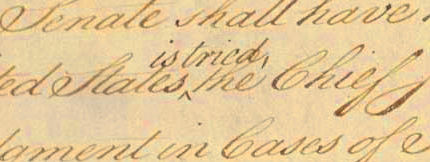Danielle Allan, a Professor at the Institute for Advanced Study in Princeton, has identified a possible error in the official transcript of the Declaration of Independence!
A scholar is now saying that the official transcript of the document produced by theNational Archives and Records Administrationcontains a significant error — smack in the middle of the sentence beginning “We hold these truths to be self-evident,” no less.
The error, according to Danielle Allen, a professor at the Institute for Advanced Study in Princeton, N.J., concerns a period that appears right after the phrase “life, liberty and the pursuit of happiness” in the transcript, but almost certainly not, she maintains, on the badly faded parchment original.
And that is a significant error!
That errant spot of ink, she believes, makes a difference, contributing to what she calls a “routine but serious misunderstanding” of the document.
The period creates the impression that the list of self-evident truths ends with the right to “life, liberty and the pursuit of happiness,” she says. But as intended by Thomas Jefferson, she argues, what comes next is just as important: the essential role of governments — “instituted among men, deriving their just powers from the consent of the governed” — in securing those rights.
“The logic of the sentence moves from the value of individual rights to the importance of government as a tool for protecting those rights,” Ms. Allen said. “You lose that connection when the period gets added.”
Finding the real answer is difficult, because the original charter is so faded:
But that document has faded almost to the point of illegibility, leaving scholars to look to other versions from 1776 to determine the “original” text.
And there, Ms. Allen argues, while those versions show subtle variations in punctuation and capitalization, the founders’ intent is clear: no period after “pursuit of happiness.”
The period does not appear in Jefferson’s so-called original rough draft(held in the Library of Congress), or in the broadside that Congress ordered from the Philadelphia printer John Dunlap on July 4. It also does not appear in the version that was copied into Congress’s official records, known as its “corrected journal,” in mid-July.
According to historical records, the Matlack parchment was signed on Aug. 2 after being compared with official texts — making it unlikely, Ms. Allen argues, that it would have contained a period after “pursuit of happiness.”
Remarkably the National Archives may change their online version.
And now the archives, after a meeting last month with Ms. Allen, says it is weighing changes to its online presentation of the Declaration of Independence.
“We want to take advantage of this possible new discovery,” William A. Mayer, the archives’ executive for research services, said in an email.
A discussion of ways to safely re-examine the badly deteriorated parchment, he added, is now “a top priority.”
Now, they only need to let people read the actual version at the Archives.
You may recall that the Constitution under glass actually has corrections for typos!
In Article I, Section 3, explaining Senate procedure upon the impeachment of the president, there is this doozy. The intended language is: “When the President of the United States is tried, the Chief Justice shall preside[.] The original uncorrected, verbless text is: “When the President of the United States the Chief Justice shall preside[.]”
How can you screw up and write something like that unless you are totally mentally wandering while doing it? This is the Constitution of the United States of America for crying out loud. You’d think you could focus. And if you can’t get it right the first time, then I say grab another sheet of parchment and start from the top of the page. Where is the craftsmanship?

